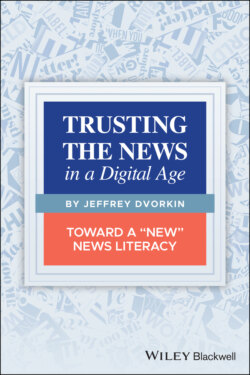Читать книгу Trusting the News in a Digital Age - Jeffrey Dvorkin - Страница 14
Why News Literacy Now?
ОглавлениеNews literacy is about regaining some of the advantages we have as citizens and as news consumers. To use a sports metaphor, it is about playing “offense” and “defense” at the same time in what is an increasingly rough sport. News literacy is about simply being aware of the pressures and prospects that the digital environment delivers.
As such, we need to apply our best critical thinking to everything we see, read, and hear in the media. In the digital age, it's no longer enough to let the tsunami of information wash over us. In effect, we will drown in what's called “TMI” – too much information. We need to have access to the media to know what is happening in order to make informed choices about the events – small and great – that affect our lives. And we need to be aware of the tradeoffs that access implies. So we need a better set of filters to handle it all.
News literacy gives us the tools to handle digital information more effectively.
To begin with, we also need to ask some tough questions about the information we are consuming, such as: What can I conclude from this news report? Is there anything in it worth keeping in mind, or can I just move on? Am I getting the truth or getting close to what might be considered the truth? Or am I being “spun” and manipulated? In the digital age, we need to be more careful without becoming unduly paranoid!
One important advantage (among many) of the digital era is that it gives us the tools to do a proper analysis … to dig deeper into what we are being told. These tools allow YOU, as the consumer of all this information, to really be in charge of the information flow.
This book will help you navigate these tools so you can determine what information is reliable and what is not – and why it is not.
News literacy is also about us, personally; it is about our reputations as citizens, as journalists, and as citizen‐journalists. None of us wants to be known as someone who has passed along faulty or misleading information. We want (and expect) to be considered among the fully engaged, intelligent, and informed citizenry, pushing our leaders to do what's right and what's smart.
News literacy is having the critical thinking skills to judge reliability and credibility in news reports, no matter where they originate in print, broadcast, online, or social media. It is about taking back control in a complex environment.
